We heard on Monday from Dekel Shalev about the harrowing experience her family had to endure on October 7th. The hours in the safe room, with no food, no water, no air conditioning, three children and a their parents—and the sense of abandonment they felt and feel at the country’s failure to protect and rescue them.
What’s next? Where does on go to heal? What does one to do try to give one’s kids the best possible shot at a healthy life and brighter future? We here in today’s episode what Dekel and her family have decided—at least as of this moment—to do.
For those interested in helping the Shalev family heal and get back on their feet, we’re sharing a GoFundMe page for the Shalev family here.
As we just had a granddaughter born in the States a few days ago, we’ve traveled to spend some time with our kids and the new addition.
So during what is the period of The Three Weeks on the Jewish calendar (the Seventeenth of Tammuz, July 23 through Tishav B’Av, August 13 we’ll be posting at a somewhat reduced rate.
But podcasts for our paid subscribers will continue as usual, and there will be other posts as well.
Today we are sharing the second part of my conversation with Dekel Shalev and make it available to all our listeners. The link at the top of this posting will take you to the full recording of our conversation; below is a transcript for those who prefer to read.
As I noted on Monday, I had the great honor and privilege of meeting Dekel Shalev a few weeks ago; we were put in touch by a mutual friend, David S. Dekel was on a trip from the US to Israel, to go back to the kibbutz and to their house for the first time since the attack, and to tell her story to the media.
It takes great courage to do those things under any circumstances, but all the more so to do so in an language that is far from your native tongue, in which you know that you’re going to be able to share the basics, but not necessarily all the subtleties that are so important to you.
So on behalf of all our listeners, I want to thank Dekel not only for her time, but for the great courage that this conversation demanded of her.
So, we've spoken about what happened. I mean, we got a little brief, a little bit of an introduction to your life. Very brief. I mean, your life was more than five minutes before October 6. But, okay, family of five, you're born in Be’eri, husband's from Yad Mordechai, you're there. You described to us in great detail what happened actually on October 7.
Let's start at the end. The end is that right now you and your family are living in Denver. And I'm very interested and I think that many of our listeners will be in hearing what those first few weeks were like. You were at the Dead Sea, I assume.
Yeah. Four weeks.
Four weeks. And then you went to the States. When did you go to the States?
November 2.
Yeah. So, about two months later. And I'm very interested in hearing whatever you want to share, obviously. What you don't want to share, you won't share. But when you went, what was the thought? We just need to get the heck out of here. We need to be able to breathe?
The second day on the Dead Sea, we just spoke, me and my husband, and we understand that we can’t stay because it was a lot of pressure in the community and the Dead Sea and all the evel [mourning], all the…
All the mourning and the grief.
We just, and we understand that the war is coming.
You knew there was going to be a war.
Yes. So, we just saying that we don't want the kids to hear again, like shooting or something that can scare them. It was a lot of scary, the Dead Sea, we hear a lot of things outside and we're just waiting for the new passport and all the documents because we didn't have nothing.
You had nothing. So how did you get, like, where's your driver's license? Where's your ID?
We are just waiting for the new ones.
So, you couldn't go back. Nobody went back to your house to get anything?
No, no.
So all the clothes, you had to get all new clothes. People were donating lots of stuff. I know.
All of the companies like misrad rashui, misrad hapnim came…
So, all the various ministries they came and they helped you get passports and driver's licenses.
So, we're just waiting for our new passport. And then my family invited us to Colorado. And this is why we are here.
That's why you're in Colorado?
Yes.
How did the people in the kibbutz feel about your leaving Israel going America? Was there differences of opinion? Were people just keeping it to themselves?
Yes. It's not easy for us to make this decision. But yes, no, it's not easy.
And when you went, did you think you were going for a short period of time? You didn't know? You thought you were….
No, we didn't know. We just, we started like tour visa for three months and no, we didn't know where we going, where are we going or how much time. And now I don't know too, like…
You don't know what the plans are?
No, not really.
Right. And your sister still here in Israel, I assume?
My mom, my dad, my mom, all my family. Just us…
And are they supportive of your decision? Do they want you to come back?
They understand that.
They understand.
My mom she misses us…
Yeah. How do you think about it? I mean, again, you're only sure what you want to share, but I mean, when you guys, you know, have these conversations over coffee in the morning or, you know, at the end of the day when you're chatting, does this feel like a place that it's impossible to raise kids normally, does it feel like a place that you think is going to get better? Does it feel like a place that you think is after its best period?
In Israel.
Yeah, in Israel.
No, this is why I'm not here.
You think, you think the good days are over here?
Yes. I think we can’t go back after October 7. It's never been the same.
And the whole country?
Yes, but the peripheral, like…
No, for sure, Be’eri and the otef [envelope area] will always be different. I’m interested in you as an Israeli woman who's lived your whole life, you understand the country very well.
I think it's different because, because my kids and my trauma. It's different from who is living on Tel Aviv and just hear the…
100%.
So, if my kids hear now the siren, it is different from the kids living in Tel Aviv here it. And so, this is why I think, I don't want one day…
You don’t want them to have to live through this anymore.
Yes.
And, okay, so leaving aside you and your husband and leaving aside your kids, I'm just interested in hearing about, you know, you as an Israeli woman who's, you know, lived through your whole life and you're watching what's happening in the country. When you sort of, you imagine, you know, 40 years from now, right, and you're looking back at 2024, 2025…
I think if my kids, when they will be older and they want to come back, so it will be different because they, if they not scared or something, when they don’t have…
Right. They have no capacity to make all those decisions, obviously. But is your sense, in your, in your gut, is your sense that, you know, “hayaim hatovim m’aharienu”, like Israel's good days are behind us or that we're in a hard period, but we can, I'm not talking about the otef [envelope], just in general in Israel, hard period, terrible time, but we can rebuild back to new great days, I mean, do you have a sense in your, like in your stomach where, where this country is and where this country is going?
I don't think all politics is good here.
Well, obviously. It's not so great in America, by the way, either.
Yeah, I know, but it's a small country, so everybody feel that. And the US, if Trump or Biden or, I don't know, is going to be the next president, so it…
It won’t make as much of a difference to your life in Denver.
Yes. This is what I think.
I'm sure you're right.
And here we feel everything…
The people that you, I mean, obviously, you know, Be’eri is a huge part of your life and a lot of friends, you know, your family and your friends and are they optimistic about the future of the country? Because you hear a lot of people saying you know, like, for example, we see these ads about the Be’eri printing company [that say] we had once the best printing press in Israel. Now we're going to make the best printing press in the world.
So, there's this sense of, we're in the second war of independence, and just like we won then, we're going to win now and we're going to rebuild. So, you hear a lot about that, but it's hard to feel a lot of that sometimes. And I'm curious, your friends…
They say that, but at the same time they said maybe they need to go and…
Nothing's happening.
Yes. And so…
But I'm interested in the people that are the Be’eri friends and stuff, are they genuine, generally optimistic about the future of the country, or are they?
Yes, but I think it depends if you have a little kid so no.
It’s harder if you have little kids.
Yes.
So, can I ask how your kids are doing?
It's very difficult.
Yeah. They still relive it all the time?
They talk about that and they, yeah, the trauma is alive.
Was it hard from them that you came to Israel now, left them?
Yeah. They're very scared.
I can imagine. They're worried about you. Right. You're coming back to the place where bad things happen.
Yeah. I told them that I'm going to Be’eri to bring some stuff and what games you want that I'm looking and. But I promised them that I'm not sleeping there and just few hours…
And then you texted them when you were out and told them you were okay, I guess?
Yeah.
What was it like to go back to Be’eri?
Um…
Was it your first time back or had you been back?
No.
So, it's your first time back nine months after the horror. The house is still there?
Yes.
Is it just like you left it or did somebody clean things up a little bit?
Not clean, no, it's very mess, no electronic yet. So, I need to bring a flashlight…
And emotionally to go back into that house. What was it like? You didn't go by yourself, I'm assuming, right?
Yes, I am.
You went by yourself?
Yeah.
Wow. Okay. I don't think I could have done that, but okay. So, you went by yourself.
Yeah, I know myself.
So, better for you to be alone.
Yes.
And what'd you take?
Some clothes and games, but we don't have. Yeah. Not something special, but special for us, for the kids.
They'd stolen, you said all your jewelry and that stuff, right?
Yes. I don’t have a wedding ring. Nothing.
Nothing. No engagement ring? No wedding ring? They took everything.
Yes.
And what's your sense of what's going to happen with the kibbutz? Most of your friends want to move back. Most of your friends want to stay in Israel and go somewhere else. Some of your other friends want to leave Israel. How is it divided?
I think they, a lot of them want to go to stay with the community and go to Hatzerim, but they don't know yet if they want to come back to Be’eri.
How long are they going to be in, I mean, Hatzerim is the place where it's going to be temporarily, but how long are they thinking it's going to be to be? Years?
Yesterday someone told me like four years. So, yes, it's a lot of time.
You know, it reminds me of the mifunim from Gaza a little bit. Right? I mean, the families, it's very different political crowd. But the people who were, you know, people who lived in Gush Katif who were evacuated, taken out, whatever you want to call it, in 2005. And we have students here at Shalem who were in those families. They were here for a few years. They were there for a few years. One student here told me that they were taken out of Gush Katif when he was a little boy, and they got their final house right when he went into the army. So, it was like 12-13 years…
I hope no…
No, no, I know what I'm saying. But it reminds us, it's a very different population, and one lost their homes in Gaza, and one lost their homes outside Gaza. But this idea of not being able to go right away is... So, the thought is several years in Hatzerim, and so the people in Be’eri, most of your friends, people that you would hang out with on Shabbat afternoon, they want to go to Hatzerim, they want to stay in Israel and go somewhere else? They want to get out of Israel? How is it dividing up? How are people talking about it?
A lot of them go to Hatzerim, I think.
And then people are splitting up?
Yeah.
Well, yeah, it's hard to, you know, nobody can judge any decision that anybody else makes. Everybody lives through the trauma their own way, and everybody needs to rebuild their life in their own way. I want to ask you something about where, regardless of where you live, it makes no difference, your view of the conflict with the Palestinians. I'm curious. And again, you'll say whatever you want to say.
Be’eri was very, very left.
And were you part of that? Were you also pretty left?
My grandma was like, she was taking a car and take, like, sick people from Gaza to inside to Israel.
Was it “B’derech L’chahlmah” [Road to Recovery] or a different group? Something like that?
Yes. Something like that.
So, yeah, these are groups. We actually interviewed somebody on our podcast from this years ago. They pick up Palestinians at checkpoints, drive them to Israeli hospitals, then bring them back. So, your grandmother was doing that?
Yes.
So, you're a hardcore coexistence… What's your feelings about the conflict now?
Now I just, I don't care. I really don't care.
You don't care about what? You don't care about…?
About the people because I think everybody's involved.
So, the people say, you know, “what about the innocent Gazans?”
No, nobody is innocent.
Nobody's innocent.
No, no.
Yeah, I know a lot of people who feel the same way.
In my home, probably they get inside, the weren’t…
They weren’t Nukhba, they weren't terrorists.
Yeah.
Because the ones who came later in the afternoon were definitely not part of the elite units. They were just Palestinian civilians. So, in your mind, your peace activism and your grandmother's…
My grandma is going to say the same.
She’s going to say the same thing as you?
Yeah.
She's done.
She's done.
She's not driving anybody to any place anymore.
No, no. She said that no more.
And so, the people that you talk to from Be’eri, who obviously live right on the Gaza border, many of whom were left peace, you know, peace seekers, whatever, who now are, you know, sort of sobered up, as they like to say here in Israel a little bit. I know you don't talk about this most of the time because you have other things to talk about. But when it does come up, do people say what, they're just going to have to live there and we're going to keep them in there? And I don't really think about what's going to happen ultimately or?
Well, there are a lot of things, someone said that he never come back to Be’eri, until Gaza was…
Completely destroyed.
Yes.
This is a person from the kibbutz Wwo said, I'm not coming back to Be’eri s long as Gaza is not destroyed.
Yes. And then I'm back. And some people say that we just need to learn how to work together. We need to destroy the Hamas, but it’s always….
Is politics a kind of a hard subject to talk about among the people from Be’eri these days, or is it not terrible?
I don't think so. But for me, it's not interesting. I just think about my family.
Right. Yeah. Anything by way of beginning to wrap up? I mean, we have Jewish listeners, we have non- Jewish listeners. I don't think we have a lot of people here who are very anti-Israel. It would be a pretty uncomfortable podcast for them to listen to. But what's the message you want to leave Jewish listeners with? And what's the message you want to leave non- Jewish listeners with?
The hug and all the love that we, that the Jewish community give us when we came to Colorado, is this is why we stayed there. I think if we didn't feel, like, comfortable and…
And embraced, really.
Yes. So, it's really important and it's not “muvan m’elav.”
Right. It's nothing to be taken for granted. Right.
Yeah.
And so, okay, so there's this notion of how warmly you were received and Jewish community. You have a job in the Jewish community. It's no small thing. And when you want American Jews to think of something, I mean, what's the message you want to leave with about Israel? Let's say.
That maybe the last thing that we spoke on Gaza that I think is not like hafim m’pesha.
There are no innocents.
Yes.
So, look, I mean, whether people agree with you or not, I don't really care.
Yeah.
And you don't care either. I can see it on your face. But I just want to make sure that people understand what you're saying. I mean, here's a woman who lived through literally hell with her husband and her three children, who is young. I mean, I don't know how old you are. You don’t have to tell me. But you're young and you lived in Be’eri your whole life, and you were left of center and all of that. And you're just saying, just give up this idea about Gazan innocence.
[in Hebrew]: l’fney ze ken hayiti omeret…[before this I would have said…]
No, I understand. So, before this, you would have said, of course there's innocent Gazans. But now, nine months after what Dekel Shalev is saying to us is give up…
And my friends is still kidnapped, and they, we hear the story that they was in the house of family and women and like, no, no…
They were being held in the, in the homes of quote unquote innocent people. So, you're just saying give up this idea of innocent Gazans because it's not real.
Yes.
Okay. That's sobering. And a message for the non- Jewish community who's listening to you…
Oh, I thought that…
The same thing. That’s for them too. To get real, to get, I mean, I don't want to put words in your mouth, but I just want to make sure that I understand what you're saying, to kind of get realistic and to stop having conversations about innocent...
Yeah. The Israeli, they are the terrorists, and they kill all the, no, we kill, we kill them because we need to. We want our hatufim…
We want our hostages back.
Yes.
Are you optimistic about the hostages coming home?
I don't know what to say.
Yeah. I think you and everybody else.
I just hope.
Yeah. We have to hope and pray, and we'll see. I mean, we're having this conversation right now when the negotiations are going on. But I was literally in the car, you know, an hour or two ago coming here to see you. I remember I was stopped at this red light, and the guy that just got to Doha for the negotiations said, it's going to be complicated. It's going to take weeks.
Yeah.
And I thought, oh, if I was one of those parents…
Yeah, but this is what I not take it seriously.
Like you're not optimistic?
No, I can't.
Yeah. It's hard to build up hope. Anyway, Dekel, first of all, just thank you for going through this in any language. I know you're going from here to a different television studio. You're doing this over and over again. And I can't imagine how hard it is, but I certainly can't begin to imagine doing it in a language that's not my first language and that you're just learning. And your English is very good.
It's my first time.
And it's your first time doing an English, so kol hakavod. But just thank you for sharing. I think, and I told you this also before we started, that I was just at the ANU museum at Tel Aviv University's campus last week, and they have an exhibit about October 7. And it's got tons of photographs, like a kind of a PowerPoint of lots of different hundreds of photographs. And you don't see anything terrible. You don't see blood. You don't see bodies. You don't see anything like that. But it reminded me how much even we who live here, how it's become kind of a distant. My wife and I both, we couldn't move afterwards. We just sat there in the museum, and we didn't leave the museum and we didn't go for a while to any other exhibits. We just sat in the hall on a bench. We didn't talk to each other. We didn't get on our phones. We just sat. And because it brings it back. And even those of us who live here and those of us who read about this all day long and talk about this all day long and write about this all day long, there's nothing as powerful as meeting someone and hearing someone whose family went through this to remind us of what we can never forget.
And I'm just very grateful to you for the courage and the willingness to spend the time. And I wish you and your family only good things. And I hope that one day your children will be able to say it was horrible. And we're moved beyond and we're building good lives, meaningful lives, interesting lives with people that love us and that we love. And I hope the next time that you and I get together and meet, maybe in Denver, maybe here, who knows, that we'll be able to talk about how much better things have gotten. Who knows?
Thank you so much.
Music credits: Medieval poem by Rabbi Shlomo Ibn Gvirol. Melody and performance by Shaked Jehuda and Eyal Gesundheit. Production by Eyal Gesundheit. To view a video of their performance, see this YouTube:


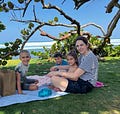





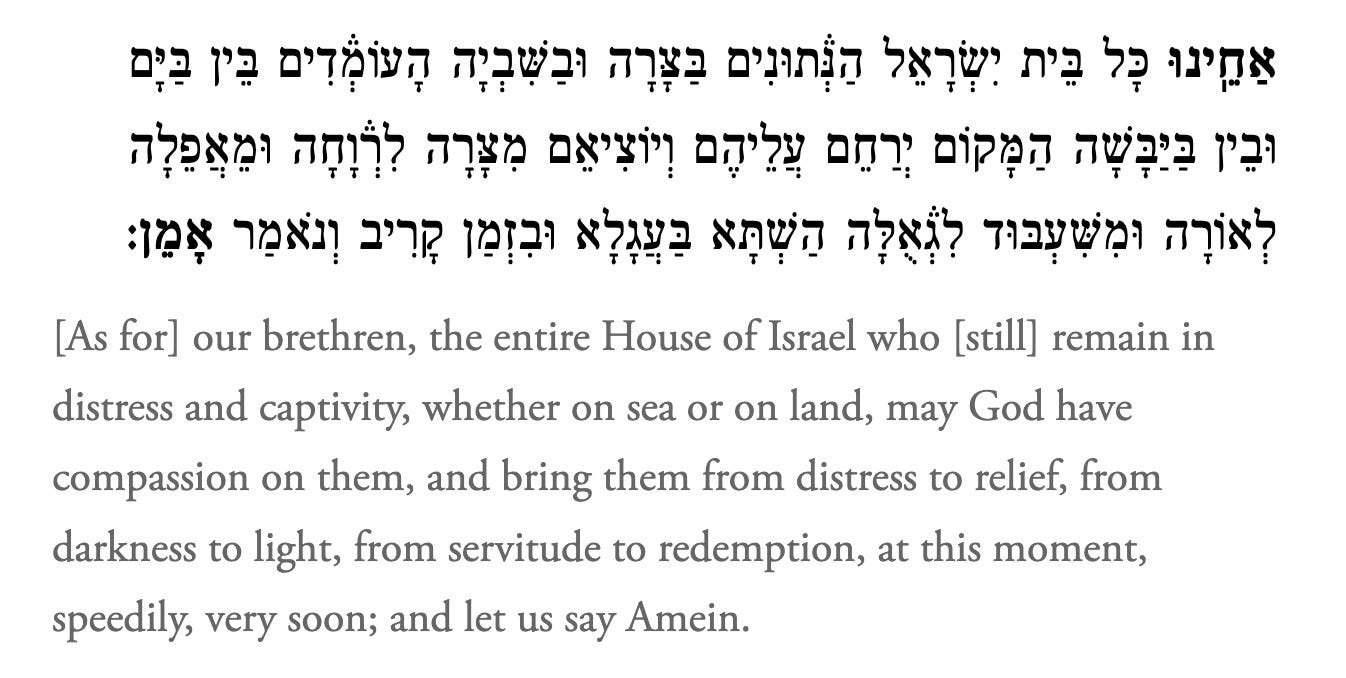

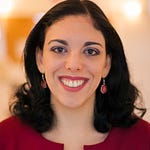

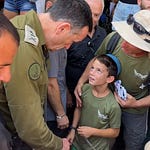
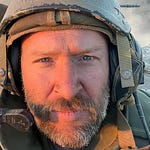
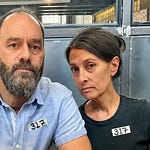

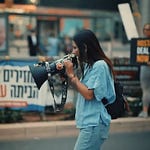

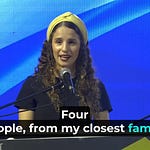
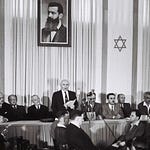
When your world is destroyed, where do you go? What do you do? Where do you build a future?